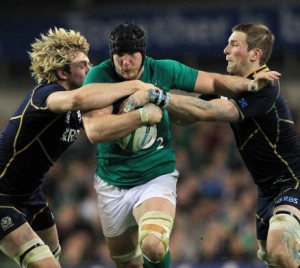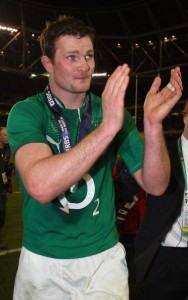By Claire Glancy
IT WAS always going to be interesting to see how Ireland would respond to last week’s draw with France: would they be able to build on their first-half performance in Paris? Or would surrendering the lead and failing to get on the scoreboard after the break leave them with a hangover?
Scotland have found themselves battling with Italy for the wooden spoon in recent years, but their results do not reflect how threatening they can be or how close they often come to pulling off a tournament-altering win (in 2010 they spoiled Ireland’s hopes of leaving Croke Park with a Triple Crown). Last year, the Ireland players were subjected to abuse from their own fans after an ‘ugly’ three-point win at Murrayfield, which shows how much expectation has grown among the nation’s rugby supporters.
Thankfully this time around, Ireland produced a performance that was at times a delight to watch. Not just for the result – a 32-14 win – but the way they committed to playing fast, attacking, ‘eyes-up’ rugby. They ran from their own line, they moved the ball into space quickly, they kicked in order to attack and they played with real speed.
The stats imply that Ireland didn’t play as well as they have in the past, but it just goes to show that stats do lie. They missed more tackles, they had less possession – but they ran out comfortable winners. Scoring four tries in international rugby is no mean feat, but with better execution and some more effective decision-making they could have scored more.
Quick tap penalties got Ireland on the front foot and although those of us watching couldn’t understand why Ireland weren’t kicking the points when they were on offer, it was good to see a side willing to have a go. Even better, was to see that risk-taking pay off. Much of Wales’ and England’s success in this championship has been laid at the feet of their carefree and exciting young players, those playing without fear. It almost seemed as if Ireland’s experience was the thing holding them back, but if against Italy the shackles started to loosen, then yesterday they came off. Rob Kearney and Stephen Ferris have impressed throughout the tournament (on Saturday the latter produced another physical masterclass) but all involved should be pleased with their efforts.
Scotland are a fit team, but when Ireland injected pace, the Scottish defence were made to work harder and as a result had to execute skills when fatigued. This led to a high error count by the Scots but credit has to go to the Irish defence for putting them under such pressure and the Irish attack for pushing them more than they have done before.
The Scots have the strongest lineout in the competition and hadn’t lost a single one before coming up against Ireland. For the hosts, it is definitely still a work in progress but after misfiring early on, Ireland began to look much sharper than they had done in previous weeks. They won five and lost two but the process seemed quicker and the Irish cut numbers more often. Donnacha Ryan proved himself a fitting replacement for Paul O’Connell and O’Connell’s injury is perhaps the only thing saving Donncha O’Callaghan from a seat on the bench.
For the final match discipline will have to improve, especially given the reliability of Owen Farrell’s kicking. Ireland’s recent record against England is impressive but Stuart Lancaster’s reign has brought a new spirit and enthusiasm into the side. Having won three away games this year, Lancaster will be hoping he’s done enough to make his role a permanent one and victory over Ireland would almost certainly seal the deal. The Irish travel to Twickenham with nothing to play for but pride on St Patrick’s Day – but pride is all the motivation Ireland need when it’s England who lie in wait.







